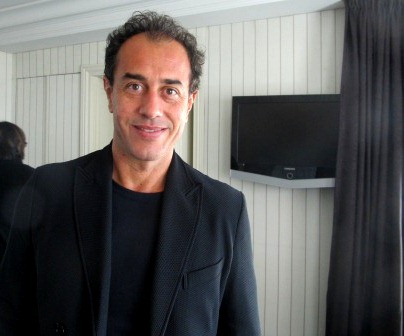
The story of a fishmonger in Naples, so taken with the possibility of being on a reality show (Big Brother) that he brings his life to ruin, Reality is about how easy it is for a human being to become consumed by artificial dreams to the point of mental illness.
This is director Matteo Garrone's own take on his movie as well. Speaking with a small group of journalists, he explained that his new movie, Reality, has no political meaning, and certainly nothing to do with Berlusconi, as many opined.
"No, it is not a critique of capitalistic changes in Italy," Garrone stated, clearly chagrinned about public misinterpretation. "Pasolini already did that back in 1979."

The film was also -- another wince -- not a homage to forefathers in Italian cinema, such as Fellini, who also featured deluded individuals on wild sets.
"Why does it have to be about anything else?" Garrone asked. "It is about this one man who goes berserk about wanting to be on Big Brother."
The movie is a pleasure to watch, as we participate in Luciano's intimate life in his Neapolitan home: the grandmother steadily breading eggplant in the kitchen while Luciano waxes passionately about his chances to be selected.
Contrary to other critics, who compared this film unfavorably to Garrone's earlier prize-winning hard-hitting Gomorrah, I enjoyed this movie precisely for its difference from its predecessor -- as a comic voyage into one individual's silly world. Wonderful scenes keep the film lively. One hilarious scene takes place poolside, with the family, when the phone rings and Luciano thinks it may be his lucky break. Another is a scene of Luciano throwing furniture out the window, in full delusion that the homeless below are secretly Big Brother agents.
The character is played with vitality by Aniello Arena, in "real" life a convicted Mafia killer who was allowed to leave prison during the day to make the film (a greater treat, I imagine, than to be on a reality show).
"I wanted to make a story that is lighter," Garrone commented. "And I saw this article about a true story, and wanted to focus my film on this one individual."
True to Garrone's intentions, the movie does make one reflect on how easy it is to become deluded, whether for a reality show or a love affair, or for any imagined calling.
Yet it also falls short. It fails to go that extra mile to offer a particularly new perspective on the mental life of the crazed individual. The premise is so intriguing, we want more than just an inexorable run to madness.
But a run to madness in Italy is always charming, and a good way to spend the afternoon.
